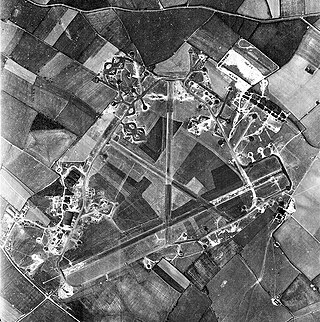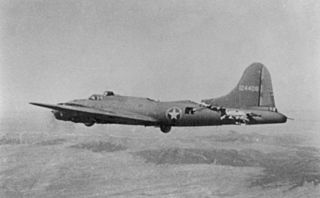
Nose art is a decorative painting or design on the fuselage of an aircraft, usually on the front fuselage.

The 100th Air Refueling Wing, nicknamed the Bloody Hundredth, is a United States Air Force unit assigned to the Third Air Force, United States Air Forces in Europe – Air Forces Africa. It is stationed at RAF Mildenhall, Suffolk, United Kingdom. It is also the host wing at RAF Mildenhall.

Royal Air Force Chelveston or more simply RAF Chelveston is a former Royal Air Force station located on the south side of the B645, 5 miles (8.0 km) east of Wellingborough, near the village of Chelveston in Northamptonshire, England. During the Second World War the airfield was occupied by both the Royal Air Force and the United States Army Air Forces. It was given the USAAF designation Station 105.

Royal Air Force Polebrook or more simply RAF Polebrook is a former Royal Air Force station located 3.5 miles (5.6 km) east-south-east of Oundle, at Polebrook, Northamptonshire, England. The airfield was built on Rothschild estate land starting in August 1940.

|}

USAAF unit identification aircraft markings, commonly called "tail markings" after their most frequent location, were numbers, letters, geometric symbols, and colors painted onto the tails, wings, or fuselages of the aircraft of the United States Army Air Forces (USAAF) during the Second World War.

The 351st Missile Wing is an inactive United States Air Force unit, which was last based at Whiteman Air Force Base, Missouri. Assigned to Strategic Air Command for most of its existence, the wing maintained LGM-30F Minuteman II ICBMs in a state of readiness to fire, pursuant to any launch orders that might be received from the National Command Authority. It was inactivated in 1995.

Thunderbird was a high mission-tally Boeing B-17G Flying Fortress of the 303rd Bombardment Group during World War II. The original plane, serial number 42-38050, was scrapped at the end of the war and no longer exists. The name also appears on a later B-17G delivered at the end of the war, serial number 44-85718, which remains airworthy and is painted to replicate the earlier Thunderbird.

Piccadilly Lilly II is a B-17 Flying Fortress currently on display at the Planes of Fame air museum in Chino, California. Built in 1945 as a B-17G and assigned serial number 44-83684, this plane was possibly the last aircraft assigned to the Eighth Air Force / 447th Bomb Group, but perhaps not delivered. It was the last active B-17 in the United States Air Force, and retired in 1959 after nine years as a DB-17P drone director. Following its military career, the plane appeared in various television shows and movies.

Nine-O-Nine was a Boeing B-17G-30-BO Flying Fortress heavy bomber, of the 323d Bombardment Squadron, 91st Bombardment Group, that completed 140 combat missions during World War II, believed to be the Eighth Air Force record for most missions without loss to the crews that flew her. A different B-17G, painted to mimic the Nine-O-Nine, crashed at Bradley International Airport in Windsor Locks, Connecticut, in October 2019.

Texas Raiders was an American Boeing B-17 Flying Fortress, a B-17G-95-DL built by Douglas Long Beach. In 1967, it was purchased by the Commemorative Air Force's Gulf Coast Wing "Texas Raiders" group, which maintained and flew the aircraft out of Conroe-North Houston Regional Airport in Conroe, Texas. The aircraft was destroyed on November 12, 2022, by a mid-air collision with a P-63 Kingcobra at an air show at Dallas Executive Airport, Texas, that killed all five occupants and the P-63 pilot.

The 351st Air Refueling Squadron is part of the 100th Air Refueling Wing at RAF Mildenhall, England. Since 1992, it has operated the Boeing KC-135R/T Stratotanker aircraft conducting primarily aerial refueling but also airlift and aeromedical evacuation missions.
Melun Villaroche Aerodrome is an aerodrome located 8.5 km (4.6 NM) north of Melun, a commune in the Seine-et-Marne department in the Île-de-France region in north-central France.

The 511th Bombardment Squadron is an inactive United States Air Force unit. It was last assigned to the 351st Bombardment Group at Fairfax Field, Kansas, where it was inactivated on 27 June 1949.

Yankee Lady is a Boeing B-17 Flying Fortress, previously owned by the Yankee Air Museum of Van Buren Township, Michigan. Originally delivered to the U.S military in 1945, the plane did not see combat action; it was used by the United States Coast Guard for over a decade. Purchased by the museum in 1986, it has since been restored to a World War II configuration and is flown for flight experience rides and airshow appearances. The aircraft was sold to an unknown party in June 2024.

The 3205th Drone Group is a discontinued United States Air Force unit that operated obsolete aircraft during the 1950s as radio-controlled aerial targets for various tests. It was the primary post-World War II operator of surplus Boeing B-17G Flying Fortress aircraft, and also operated Lockheed F-80 Shooting Star and a few Boeing RB-47 Stratojet bombers that were converted into drone aircraft during the early years of the Cold War. It was last active with the Air Proving Ground Center, based at Eglin Air Force Base, Florida, where it was discontinued on 1 February 1961.

Boeing B-17G Flying Fortress No.44-83690 is a B-17 Flying Fortress heavy bomber currently undergoing restoration at the Museum of Aviation near Robins Air Force Base in Georgia. It was built as a B-17G-95-DL by the Douglas Aircraft Company and delivered for use on May 9, 1945. It was flown to Grissom Air Force Base for display as a museum piece in 1961. The plane was listed on the National Register of Historic Places in 1993. It was moved to the Museum of Aviation in August 2015.

The All American was a World War II Boeing B-17F Flying Fortress heavy bomber that was able to return safely to its base after having its rear fuselage nearly cut off by an in-flight collision with a German Bf 109 over enemy-held territory. The bomber's flight is said to have yielded one of the most famous photographs of World War II, and has been linked with the phrase "Comin' in on a Wing and a Prayer." It inspired the 414th Bombardment Squadron's emblem, an image of a puppy praying atop an aircraft's tail section.


















